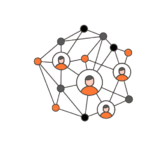
Why Great Developers Are Made, Not Hired: Insights for Tech Teams
Kristijan Pušić | June 17th, 2024
In the IT industry, the common belief is that the best developers are out there waiting to be discovered and hired. However, the reality is that great developers are often made, not found. Cultivating exceptional talent within your IT team involves more than just an effective hiring process. It requires a commitment to continuous learning, mentorship, and a supportive company culture.
In this article, we’ll explore why having a mentorship program is crucial and provide insights into how tech teams can nurture and grow their developers into top class professionals.
The Limitations of Hiring
Hiring skilled developers is essential, but the process has its limitations. Even the most thorough hiring process can only assess candidates based on their past performance and current skills. It’s impossible to predict how they will grow and adapt within your specific organizational environment.

Onboarding skills of a Technical Lead will help each skilled developer to fully develop inside your company. Moreover, the rapidly evolving nature of IT means that the skills that are relevant today might not be as crucial tomorrow. Therefore, focusing solely on hiring can lead to missed opportunities for growth and innovation.
The Power of Mentorship and Continuous Learning
Mentorship is a cornerstone of developing great developers. Pairing less experienced developers with seasoned mentors allows for knowledge transfer, skill enhancement, and professional growth. Mentors provide guidance, share insights from their own experiences, and help mentees navigate challenges.
This mentor – mentee relationship fosters a culture of continuous learning, where team members are encouraged to expand their skill sets and stay updated with the latest technological advancements. A supportive company culture is vital for nurturing talent. This includes creating an environment where developers feel valued, respected, and motivated. Encourage open communication, collaboration, and the sharing of ideas. Recognize and celebrate achievements, no matter how small, to boost morale and reinforce the value of each team member’s contributions. Providing opportunities for professional development, such as attending conferences, participating in workshops, and accessing online courses, is also crucial. Atlassian provides a compelling example of how to develop great developers from within. Their approach focuses on building effective mentoring relationships tailored to different career stages, which significantly boosts team effectiveness and personal growth. They prioritize continuous learning, where both mentors and mentees engage in a cycle of feedback and development to enhance their skills and capabilities .
Competence Matrices
Competence matrices are effective tools for tracking and promoting the development of technical and soft skills. These matrices outline the skills and competencies required for various roles within the organization and help identify areas for improvement. By regularly reviewing and updating these matrices, IT teams can ensure that their developers are continually progressing and aligning their growth with the company’s strategic goals.
The Role of Feedback in Developer Growth
Constructive feedback is essential for growth. Regular performance reviews and one-on-one meetings provide opportunities for developers to receive feedback on their work and discuss their career aspirations. This feedback should be specific, actionable, and delivered in a supportive manner. Additionally, encouraging developers to seek feedback from their peers fosters a collaborative environment and promotes self-improvement.

Great developers are indeed made, not just hired. By focusing on mentorship, continuous learning, a supportive company culture, and regular feedback, IT teams can cultivate their developers into top class professionals. This approach not only enhances individual growth but also drives the overall success of the organization. Investing in your team’s development is a strategic move that pays dividends in innovation, performance, and employee satisfaction.
Setronica, with 25 years of experience in working with java solutions, has a strong business continuity history within its competence matrices. A long period of time for making a strong expertise with enterprise java solutions. Feel free to contact me via a form below if you have any questions regarding competence matrices and measuring team performance.
FAQ
Why is hiring not enough to ensure a team of great developers?
Hiring can bring in skilled individuals, but it does not guarantee their growth within the organization. Continuous development, mentorship, and a supportive culture are essential to nurture and enhance their skills.
How can mentorship programs benefit tech teams?
Mentorship programs facilitate knowledge transfer, provide guidance, and help developers navigate challenges. They promote continuous learning and professional growth, which are crucial for staying updated with technological advancements.
What role does company culture play in developing great developers?
A supportive company culture creates an environment where developers feel valued and motivated. It encourages open communication, collaboration, and professional development, all of which are vital for nurturing talent and fostering innovation.
Related posts
- Navigating Challenges: Being a Good Technical Lead, part 5
 In previous articles, I have explained four essential skills for Technical Leads, they were leadership, mentorship, onboarding, and hiring.
In previous articles, I have explained four essential skills for Technical Leads, they were leadership, mentorship, onboarding, and hiring. - How to Efficiently Scale Your Startup’s Tech Stack for Maximum Growth
 When scaling your IT startup, choosing the right tech stack is crucial to ensure efficiency, flexibility, and long-term growth.
When scaling your IT startup, choosing the right tech stack is crucial to ensure efficiency, flexibility, and long-term growth. - 9 Key Measures to Protect Digital Assets and Ensure Data Integrity
 Digital transformation represents a significant shift in the way an IT company operates, impacting every aspect of the IT business from operations to customer engagement.
Digital transformation represents a significant shift in the way an IT company operates, impacting every aspect of the IT business from operations to customer engagement. - 8 Cloud Transformation Strategies for Large Enterprises
 Migrating legacy systems to the cloud is a critical move for large enterprises aiming to enhance flexibility, scalability, and efficiency of their software solutions.
Migrating legacy systems to the cloud is a critical move for large enterprises aiming to enhance flexibility, scalability, and efficiency of their software solutions. - 7 Ways to Become A Better Software Engineer Mentor
 Continuous learning and mentorship in IT has always been a cornerstone of a software developer’s career.
Continuous learning and mentorship in IT has always been a cornerstone of a software developer’s career. - 6 Tips for Building Effective Mentorship Relationships in Software Engineering
 Mentorship can be either formal or informal. Formal mentorship takes place within a structured mentoring program inside an IT organization.
Mentorship can be either formal or informal. Formal mentorship takes place within a structured mentoring program inside an IT organization.
Ready to Enrich Your Team?

Kristijan Pušić
IT consultant and Business developer
Our consultant is at your disposal from 9 AM to 5 PM CET working days from Monday to Friday for any additional questions.
Recent Posts
- How Brands Use AI to Track, Trace and Prove Their Sustainability Claims
- How AI Recognizes Waste: Smart Recycling Technologies in Action
- Rapid Hypothesis Testing for Driver Retention in Delivery Service
- How Setronica Created an AI Slack Bot, Part 3: Putting Our Bot to Work
- Building a Reliable Monthly Accrual Report: Overcoming Challenges and Implementing Solutions
